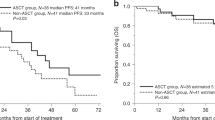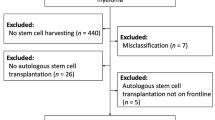Abstract
Non-Hispanic Black patients are disproportionally affected by multiple myeloma (MM) and whether efficacy outcomes after autologous stem cell transplant (ASCT) differ by race and ethnicity remains an area of active investigation. This study included 449 patients enriched with a large proportion of non-Hispanic Black patients and sought to highlight the impact of race and ethnicity on outcomes after HDT-ASCT for patients with newly diagnosed MM. We found induction chemotherapy followed by high-dose therapy-ASCT and maintenance chemotherapy is associated with long-term PFS and OS, regardless of race or ethnicity.


Similar content being viewed by others
References
Rajkumar SV (2022) Multiple myeloma: 2022 update on diagnosis, risk stratification, and management. Am J Hematol 97(8):1086–1107. https://doi.org/10.1002/ajh.26590
Siegel RL, Miller KD, Wagle NS, Jemal A (2023) Cancer statistics, 2023. CA Cancer J Clin 73(1):17–48
Benjamin M, Reddy S, Brawley OW (2003) Myeloma and race: a review of the literature. Cancer Metastasis Rev 22(1):87–93
Ailawadhi S, Aldoss IT, Yang D et al (2012) Outcome disparities in multiple myeloma: a SEER-based comparative analysis of ethnic subgroups. Br J Haematol 158(1):91–98. https://doi.org/10.1111/j.1365-2141.2012.09124.x
Ailawadhi S, Jacobus S, Sexton R et al (2018) Disease and outcome disparities in multiple myeloma: exploring the role of race/ethnicity in the Cooperative Group clinical trials. Blood Cancer J 8(7):67. https://doi.org/10.1038/s41408-018-0102-7
Peres LC, Colin-Leitzinger CM, Teng M et al (2022) Racial and ethnic differences in clonal hematopoiesis, tumor markers, and outcomes of patients with multiple myeloma. Blood Adv 6(12):3767–3778. https://doi.org/10.1182/bloodadvances.2021006652
Richardson PG, Weller E, Lonial S et al (2010) Lenalidomide, bortezomib, and dexamethasone combination therapy in patients with newly diagnosed multiple myeloma. Blood 116(5):679–686. https://doi.org/10.1182/blood-2010-02-268862
Schriber JR, Hari PN, Ahn KW et al (2017) Hispanics have the lowest stem cell transplant utilization rate for autologous hematopoietic cell transplantation for multiple myeloma in the United States: a CIBMTR report. Cancer 123(16):3141–3149. https://doi.org/10.1002/cncr.30747
Perrot A, Lauwers-Cances V, Cazaubiel T et al (2020) Early versus late autologous stem cell transplant in newly diagnosed multiple myeloma: long-term follow-up analysis of the IFM 2009 trial. Blood 136:Suppl 1:39–39. https://www.sciencedirect.com/science/article/pii/S0006497118693644
Richardson PG, Jacobus SJ, Weller EA et al (2022) Triplet therapy, transplantation, and maintenance until progression in myeloma. N Engl J Med 387(2):132–147
Chng WJ, Dispenzieri A, Chim CS et al (2014) IMWG consensus on risk stratification in multiple myeloma. Leukemia 28(2):269–277. https://doi.org/10.1038/leu.2013.247
National Cancer Institute (2017) Common Terminology Criteria for Adverse Events (CTCAE), Version 5.0. U.S. Department of Health and Human Services. Nov. Accessed 28 January 2023. https://ctep.cancer.gov/protocoldevelopment/electronic_applications/docs/ctcae_v5_quick_reference_5x7.pdf
Rajkumar SV, Dimopoulos MA, Palumbo A et al (2014) International Myeloma Working Group updated criteria for the diagnosis of multiple myeloma. Lancet Oncol 15(12):e538-548
United States Census Bureau Quickfacts: South Carolina. Accessed April 7, 2023. https://www.census.gov/quickfacts/fact/table/SC/PST045222
Joseph NS, Kaufman JL, Dhodapkar MV et al (2020) Long-term follow-up results of lenalidomide, bortezomib, and dexamethasone induction therapy and risk-adapted maintenance approach in newly diagnosed multiple myeloma. J Clin Oncol 38(17):1928–1937. https://doi.org/10.1200/JCO.19.02515
Fillmore NR, Yellapragada SV, Ifeorah C et al (2019) With equal access, African American patients have superior survival compared to white patients with multiple myeloma: a VA study. Blood 133(24):2615–2618. https://doi.org/10.1182/blood.2019000406
Dong J, Garacci Z, Buradagunta CS et al (2022) Black patients with multiple myeloma have better survival than white patients when treated equally: a matched cohort study. Blood Cancer J 12(2):34. https://doi.org/10.1038/s41408-022-00633-5
Nooka AK, Kaufman JL, Rodriguez C et al (2020) MM-350: daratumumab (Dara) + lenalidomide/bortezomib/dexamethasone (Rvd) in african american/black patients (Pts) with transplant-eligible newly diagnosed multiple myeloma (Ndmm): subgroup analysis of griffin. Clin Lymphoma Myeloma Leuk 20:S308–S309. https://doi.org/10.1016/S2152-2650(20)30956-3
Funding
None.
Author information
Authors and Affiliations
Contributions
J.D. and H.H. wrote the manuscript. All authors were involved in data extraction, analysis, and review of the final manuscript.
Corresponding author
Ethics declarations
Ethical approval
All procedures performed in studies involving human participants were in accordance with the ethical standards of the institutional and/or national research committee and with the 1964 Helsinki declaration and its later amendments or comparable ethical standards.
Informed consent
This study was IRB approved.
Competing interests
The authors declare no competing interests.
Additional information
Publisher's Note
Springer Nature remains neutral with regard to jurisdictional claims in published maps and institutional affiliations.
Rights and permissions
Springer Nature or its licensor (e.g. a society or other partner) holds exclusive rights to this article under a publishing agreement with the author(s) or other rightsholder(s); author self-archiving of the accepted manuscript version of this article is solely governed by the terms of such publishing agreement and applicable law.
About this article
Cite this article
Davis, J.A., Thurlapati, A., Weeda, E. et al. Impact of race and ethnicity on outcomes after autologous stem cell transplantation for patients with newly diagnosed multiple myeloma. Ann Hematol 103, 251–258 (2024). https://doi.org/10.1007/s00277-023-05503-z
Received:
Accepted:
Published:
Issue Date:
DOI: https://doi.org/10.1007/s00277-023-05503-z




